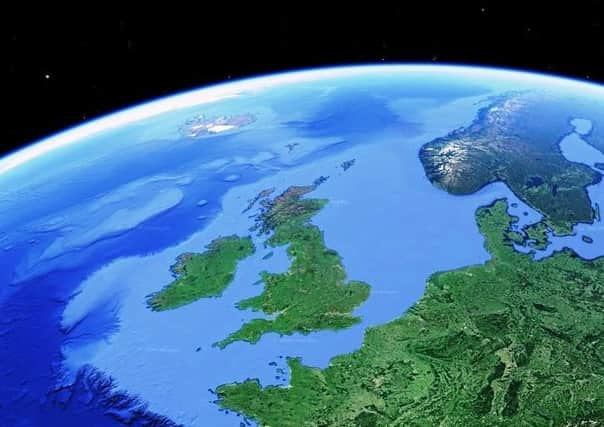Liam Kennedy: Unionists risk being seen as sulking reactionaries with no imagination


In other words, there were two distinct ethno-national groups on the island of Ireland, and this was the real source of division. Fetishizing the land boundary was to miss the point.
Nowadays most would accept that there are two different and competing sets of national aspirations on the island, the trouble being that they only roughly fit the existing political jurisdictions.
Advertisement
Hide AdAdvertisement
Hide AdThe Republic of Ireland, it is true, is overwhelmingly nationalist but of varying shades. Some have significant fellow-feeling for Ulster Protestants, either as supporters of the all-Ireland rugby team or as victims of IRA violence.
In Northern Ireland the two big minorities, Irish nationalists and Ulster unionists, account for about 80% of those who classify themselves along national lines.
But if there is a border poll sometime in the next 10 years, then it is that remaining 20% or so of the electorate that really counts.
It needs to be assured of the benefits of the Union, and Peter Robinson’s proposals in this regard seem sensible from a unionist point of view. I write as a non-unionist and a socialist but with a sense of responsibility towards both communities.
Advertisement
Hide AdAdvertisement
Hide AdA pro-Brexit stance serves to alienate liberal, labour, and the largely apolitical who might support the Union. Unionists now seem to be intent on shooting themselves in the foot once again, and more seriously this time.
By seeming to dismiss the Shared Island initiative, courageously advocated by Micheál Martin, its representatives risk painting themselves as sulky, reactionary and devoid of political imagination.
Small good the withdrawal tactic did for Ulster unionists in the aftermath of the Anglo-Irish Agreement of 1985 when Dublin carved out a consultative role in Northern Ireland affairs.
Fat good will it do in attracting non-aligned voters to unionist parties. The party which will gain most from this head-in-sand posture is of course Sinn Féin, as it goes on to further undermine moderate nationalism, North and South.
Advertisement
Hide AdAdvertisement
Hide AdBut there are positive reasons for engaging with the Shared Island Initiative. For a start, unionists could explain why they favour the Union.
The arguments range from the cultural and the economic to an understandable reluctance to enter another jurisdiction in the wake of Three Decades of Terror.
Sharing is a two-way street. There are pragmatic arguments for North-South cooperation, as most unionists accept. But there are also arguments for East-West sharing.
It is time those of us in the Republic of Ireland accepted openly the huge benefits that accrued to Irish society from close proximity to Britain from the 1920s onwards.
Advertisement
Hide AdAdvertisement
Hide AdThese included employment that was not available at home for hundreds of thousands of young Irish women and men. Britain was a place of refuge for thousands of unmarried mothers, working-class outcasts and even writers.
Think of Sean O’Casey and Edna O’Brien. But think most of those persecuted by the repressive institutions of Church and State.
The point might be put more politely, but the British dimension to the identity of all the peoples of the island of Ireland, from language, culture, law and political institutions to popular culture, might be acknowledged.
Those who reject either a British or an Irish dimension to their sense of identity, albeit perhaps subsidiary and subconscious, have little understanding of the formative power of shared histories.
Advertisement
Hide AdAdvertisement
Hide AdIn Northern Ireland there should be no problem with being both British and Irish, or Irish and British. The exceptions here are the zealots of republicanism and loyalism.
It is worth recalling that Richard Rose’s ground-breaking study of national identities in 1968, on the eve of the Troubles, found that 20% of Protestants described themselves as ‘Irish’, and another 30% as ‘Ulster’. They saw themselves as of the island.
Of course three decades of terror, followed by two further decades of aggressive nationalist pressure, put paid to that.
Still, there is no future in remaining frozen in the headlights of the past. Better to take initiatives rather than dully react with the stereotypical ‘No’.
Advertisement
Hide AdAdvertisement
Hide AdAs well as a forum for a shared future for the two islands – all the more necessary in the wake of Brexit – unionists might also do Irish democracy a service by demanding an apology for the decades of terror from the political representatives of the IRA.
And that is only a beginning to what might be a more assertive unionist response which would benefit all the democratic forces on this island.
• Liam Kennedy’s book, Who Was Responsible for the Troubles? The Northern Ireland Conflict, has just been published by McGill-Queen’s University Press
READ MORE FROM THE NEWS LETTER:
Advertisement
Hide AdAdvertisement
Hide AdCLICK HERE: Ex-top RUC man: Will Labour back public inquiries for other families – not just the Finucanes?
A message from the Editor:
Advertisement
Hide AdAdvertisement
Hide AdThank you for reading this story on our website. While I have your attention, I also have an important request to make of you.
With the coronavirus lockdown having a major impact on many of our advertisers — and consequently the revenue we receive — we are more reliant than ever on you taking out a digital subscription.
Subscribe to newsletter.co.uk and enjoy unlimited access to the best Northern Ireland and UK news and information online and on our app. With a digital subscription, you can read more than 5 articles, see fewer ads, enjoy faster load times, and get access to exclusive newsletters and content. Visit https://www.newsletter.co.uk/subscriptions now to sign up.
Our journalism costs money and we rely on advertising, print and digital revenues to help to support them. By supporting us, we are able to support you in providing trusted, fact-checked content for this website.
Alistair Bushe
Editor